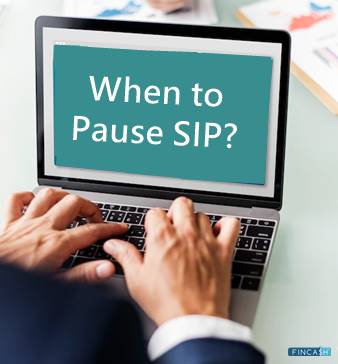When Should You Pause Mutual Fund SIP?
However, there may come a situation when the Market may not respond as per your expectations. What should be your decision in such a scenario? Should you pause the SIP investment, stop it, or reshuffle it? And, can you even do it?

In this post, find out answers to when you should pause Mutual Fund SIP to decrease your financial load.
Disadvantages of Stopping the SIP Investment
If you are thinking of stopping your SIP investment, here are some disadvantages that you should be wary of:
- You might not be able to accomplish the financial objective unless you begin a new investment
- Once you have stopped, there will be no other choice than to begin from scratch
- The advantage of compounding maximises when you regularly invest and stay invested as well. Stopping will take away this benefit from you
- Stopping the SIP nullifies the benefit of rupee cost averaging that the investment was accumulating
Owing to the reasons mentioned above, it is always better to pause your SIP than to stop it altogether.
The Right Time to Pause SIP Investments
Every SIP plan lets you temporarily pause your investments. However, this option is prevalently misused and misunderstood by a lot of investors. A lot of investors use this Facility during tough and volatile market conditions. Keep in mind that this isn’t the correct way to go about it. During hard market conditions, investors must persist and continue the investments. By doing so, you will accrue more units, which can get you better returns in the long run when the market becomes positive.
Having said that, the only time when you should consider pausing the SIP investment is when you are short of funds. If you are facing a loss of Income or a job loss, this turns out to be a great option rather than cancelling the Investment plan altogether. By halting the investment temporarily, you can get some time to sort out your funds. And, once you are back on track, you can continue the investment without paying any additional charges.
In case you cancel the SIP altogether, you will have to once again go through the entire process of getting certification from your Bank, creating the ECS mandate, and more.
Talk to our investment specialist
Key Guidelines on SIP Pause Option
A lot of Asset Management Companies (AMCs) and broking platforms have come up with the SIP pause facility lately. The idea behind this option is to keep you linked with the mutual fund Industry, as once you stop, you may discontinue the investment completely. As far as the tenure of this pause facility is concerned, it varies between a month to six months based on the AMC.
Some AMCs are also providing this facility twice. This means you can pause SIP once for one to six months and then pause it once more if things go haywire. However, to avail of this facility, you must submit the request to pause the investment a minimum of 10 -15 days prior to the SIP due date. Every AMC has different calendar days to Pause SIP, therefore it is advisable to check with the AMCs you've invested with. For example - Nippon India Mutual Fund accepts requests 12 days prior to your SIP instalment date, whereas if you have invested in Principle Mutual Fund, you'll have to apply for a request 25 days prior to your instalment date.
What Happens if you Miss a SIP Instalment?
Similar to other EMIs, if you miss a SIP instalment, banks will impose a bouncing charge. Back in the day, this SIP pause option was missing. Thus, you had to stop the investment altogether and start again from scratch. However, this pause option has brought a lot of convenience for people.
How to Apply for SIP Pause?
Follow these steps to successfully pause mutual fund SIP:
- Login to your fund house’s portal with your ID and password
- Navigate through the entire list of active SIPs that are there in your Portfolio
- Choose the one that you wish to pause
- Choose the Pause SIP option and fill-up the form
- You must put the duration for which you would like to pause the SIP
Know that once this period expires, your SIP will automatically resume, and the amount will start getting deducted from your bank account.
The Right Time to Shuffle SIP Investments
Another significant benefit of a SIP plan is that it is highly flexible. With such an investment, you can switch the funds whenever you want to invest. For example, if you are presently Investing in Equity Funds, you can switch to Debt fund for the time being before getting back to equity again.
The ideal time to use this shuffling option is when the market is under the weather. If you don’t want to stay invested in the fund throughout the tough phase of the market, you can shuffle the investment. With this, you will get a chance to stay consistent with wealth creation, regardless of how the market is performing.
When to Withdraw the SIP?
This is a most commonly asked question. The answer to it is based purely on the performance of your fund. For that, you must track how your fund is performing. If the performance is lesser than your expectation for almost a year, it might be due to market fluctuations. However, if it still continues to perform badly for almost 18 months or more, you can consider withdrawing the SIP and re-invest in a better fund.
Keep in mind that this is not the only parameter when mapping the fund’s performance. You must also check the market trend, ideally in the long-run funds tend to perform better. So you invest in equity funds, don't expect them to give good returns in 1-2 years. Have a target of at least 5-7 years.
Wrapping Up
Considering that investors are facing pressure when it comes to paying the SIPs, experts recommend waiting out. By now, you would have got the clarity of when to shuffle and when to pause the SIP investments.
All efforts have been made to ensure the information provided here is accurate. However, no guarantees are made regarding correctness of data. Please verify with scheme information document before making any investment.










